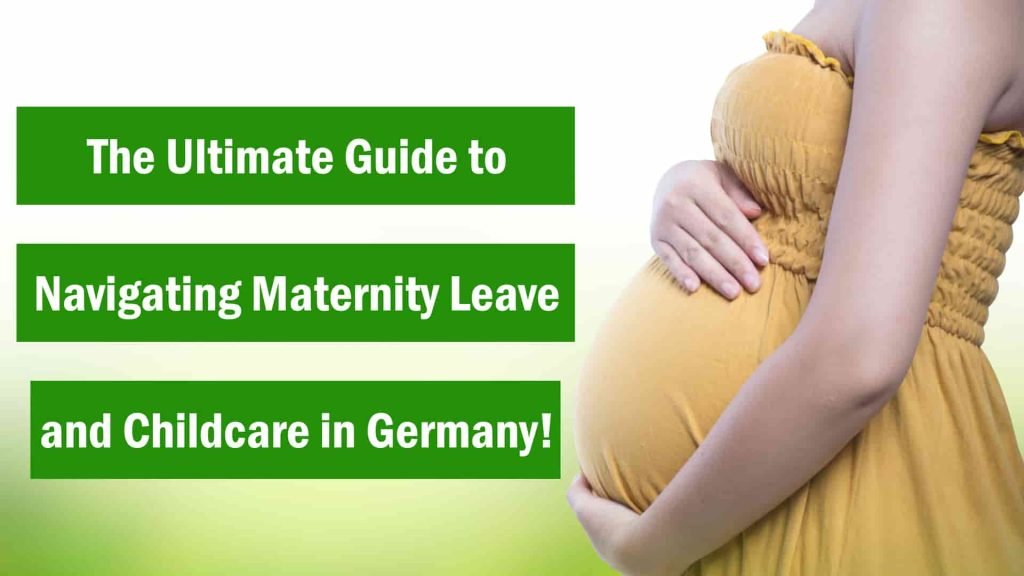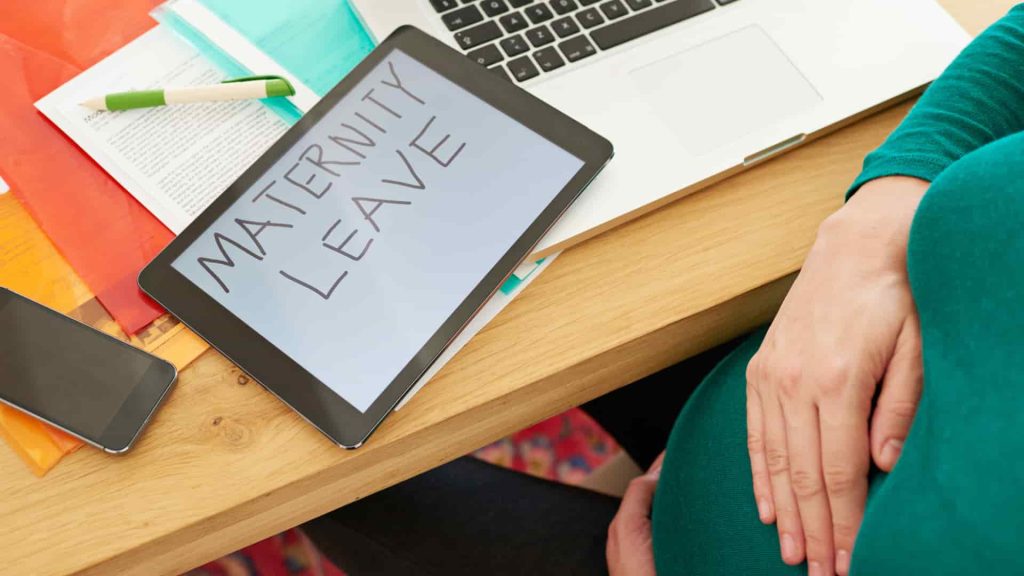
Diving into parenthood in Germany has me buzzing with excitement and, if I’m honest, a whirlwind of questions.
Right at the top of my list?
Understanding the maze of maternity leave and finding that goldilocks childcare option. But here’s the good news: I’ve decided to tackle these giants head-on and share the treasure trove of info I uncover.
From the nitty-gritty of maternity benefits to the ABCs of childcare in Deutschland, I’m on a mission to make sense of it all. So, let’s ditch the stress, grab a cozy spot, and together, demystify what lies ahead.
Let’s dive into the essentials of making your parenting experience in Germany as smooth as a well-oiled pram!

Make sure to read: Learning to Love German Winters: 5 Places to Visit in the Winter
Understanding Maternity Leave Rules in Germany
Legal Framework: Mutterschutzgesetz, or Maternity Protection Act for those of us still tangling with German pronunciations, is the cornerstone of maternity leave here. This piece of legislation is like a trusty umbrella, offering protection and peace of mind to expectant mothers braving the workplace.
It’s designed to ensure the health and safety of both the mother and the child during these crucial months, covering everything from work conditions to leave entitlements.
Eligibility:
- Pregnancy and childbirth: This is the main requirement.
- Employment status: You must be employed, including part-time and temporary contracts.
- Minimum employment duration: At least 12 months of employment before the expected due date (for maternity pay!).
- Health insurance: Covered by statutory health insurance or private health insurance with sickness benefits.
- Living situation: You and your child must live together in the same household.
- Childcare: You must primarily care for your child yourself during leave.
- Maximum work hours: Cannot work more than 30 hours per week while on leave (32 hours after September 1, 2021).

Duration: That’s right, maternity leave kicks off 6 weeks before your little one’s grand entrance. And once they’ve arrived? You’ve got a generous 8-week cocooning period to bond, navigate the early days of motherhood, and, let’s be honest, catch up on some much-needed rest.
For mothers expecting multiples or in the case of a premature or C-section birth, this postpartum leave extends even further, ensuring you have the time you need to recover and adjust.
Maternity Leave Benefits: Here’s where it gets even better—Mutterschaftsgeld, or Maternity Benefit, ensures that your financial wellbeing is taken care of during this time. This benefit acts like a steady stream, ensuring your financial reservoir isn’t running dry while you’re focusing on the little life you’ve just brought into the world.
If you’re under the umbrella of public health insurance, this benefit could see you receiving up to 13 euros per day, with your employer topping up the rest to match your full net salary.
For those navigating the waters of private insurance or higher income brackets, fear not—there’s a maximum monthly amount in place to help keep your financial boat afloat.
Also read: How to Open Your First German Bank Account?
Do Men Have an Equivalent to Maternity Leave in Germany?

Let’s hear it for the dads! Germany rolls out the red carpet for fathers wanting to be hands-on from the get-go.
While there’s no designated ‘paternity leave’ per se, fathers can dive right into parental leave (Elternzeit) to bond with their newborns. The flexibility here is fantastic—you can take time off immediately after birth or save some days for later, ensuring you’re there for the first smiles, steps, and everything in between.
Parental Leave: Elternzeit, or Parental Leave, a wonderful provision that allows both parents to hit the pause button on work and soak up those precious first years. You’re looking at up to three years of leave per child, which can be split between both parents in whatever way suits your family best.
And the cherry on top?
Your job is protected during this time, meaning you can return to your role (or a similar one) with your employment terms intact.
Parental Allowance (Elterngeld): To sweeten the deal, there’s Elterngeld, or Parental Allowance, ensuring your financial wellbeing doesn’t take a backseat while you’re busy making memories. This benefit replaces a portion of your income, allowing you to focus on your new role as a parent without the added stress of financial constraints.
Here’s the deal: you can receive between 65% to 100% of your net income, up to a cap, for a period of 12 to 14 months. The exact amount and duration depend on your pre-baby earnings and how you choose to divide the leave between parents.
For those doubling down on family time, opting for a longer stretch at a reduced rate can make those early years a little less hurried and a lot more cherished.

We think you’ll love this: 7 Best Day Trips from Berlin for History Buffs
Childcare Options That Complement Maternity Leave in Germany
There are three types of Childcare options that new parents can adopt, to ensure the hassle-free care of their newborn or toddler while they get back into the flow of working:
- Kita (Kindertagesstätte): These are daycare centers that cater to children from a few months old up to school age. They focus on early education, play, and social skills, offering a structured day with various activities.
- Tagesmutter (Daycare Mother): A more personalized childcare option, Tagesmütter are certified caregivers who look after small groups of children in their homes, providing a family-like atmosphere.
- Kindergarten: Typically for children aged three to six, kindergartens emphasize play-based learning and social interaction, preparing children for school.
Government Support for Childcare in Germany
Germany offers various forms of government support for childcare, making it easier for families to manage the financial and logistical challenges.

Universal:
- Kindergeld (Child Benefit): All families with children under 18 (or 25 if in education or training) receive a monthly payment, regardless of income. Amounts increase with each child (250€ for the first and more for subsequent children) and are tax-free.
- Tax-Free Allowance: Parents can deduct various child-related expenses from their taxable income, including childcare costs, food, and clothing.
- Parental Leave: Both parents are entitled to parental leave. Mothers receive mandatory maternity leave with income replacement (Mutterschaftsgeld), followed by optional Elterngeld for up to 14 months (replacing 65-100% of net income).
- Free Healthcare: Children have access to free preventive healthcare and subsidized medical treatment.
Don’t forget to read: How to Rent a Car in Germany?
Targeted:
- Kita-Gutschein (Daycare Voucher): Depending on income and region, families can receive vouchers subsidizing daycare costs. In some cases, they may even be free.
- Childcare Allowance: Low-income families receive an additional monthly allowance towards childcare costs.
- Single Parent Support: Single parents receive additional financial support and benefits depending on their income.
- Special Needs Support: Families with children with special needs may qualify for additional financial aid and support services.
Finding and Choosing the Right Childcare Option in Addition to Maternity Leave
With a map in hand and a clear destination in mind, finding the right childcare becomes an adventure in itself. To begin charting your childcare options, it is best to start with comprehensive and thorough research. Here are a few tips to be mindful about:
- Start Early: The quest for the perfect childcare spot should start sooner rather than later. Availability can be tight, especially in bustling cities.
- Use Local Resources: Many cities and communities offer online portals or local offices (Jugendamt) with information on available childcare services. These can be goldmines of information.
- Check Accreditation and Reviews: Look for facilities that are well-regarded and have the necessary accreditation. Online forums and local parent groups can also offer unfiltered insights.

- Visit in Person: If possible, visit the childcare centers or meet with Tagesmütter. This will give you a feel for the environment and the caregivers.
- Key Factors: Consider staff-to-child ratios, the cleanliness and safety of the facility, the educational philosophy, daily routines, and how they handle things like meals and naps.
What Does the Application Process Look Like for Availing Childcare in Germany?
- Know the Deadlines: Each facility or service may have its own application deadlines. Mark these on your calendar to avoid missing out.
- Gather Documentation: Typically, you’ll need your child’s birth certificate, proof of employment (or study), and sometimes proof of residence. Having these documents ready can streamline the process.
- Understand the System: Some areas use a centralized application system, while others require direct applications to each facility. Clarify this to ensure you’re following the right steps.
- Integration and Language: Childcare centers in Germany often focus on integration and language skills, which can be beneficial for children from international families.
- Outdoor Play: Emphasis on outdoor play and exploration is a hallmark of German childcare, reflecting the cultural value placed on nature and physical activity.
Your recommended post for the week: A Peek into a Day in German Life
On Maternity Leave and Childcare Clauses in Germany
Understanding maternity leave and childcare in Germany is crucial for expecting parents and guardians.
The nation’s comprehensive policies ensure ample support during this transformative period. By familiarizing oneself with the entitlements and available childcare options, parents can make informed decisions that best suit their family’s needs. Germany’s approach, emphasizing work-life balance and child welfare, offers a robust framework for families to thrive. As society continues to evolve, these provisions remain pivotal in fostering a nurturing environment for the next generation.




